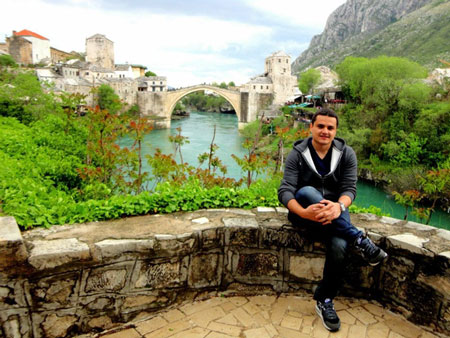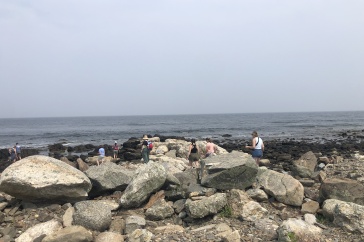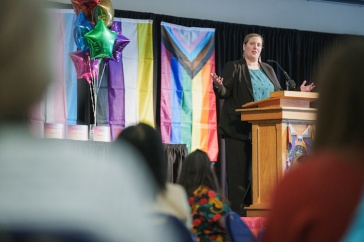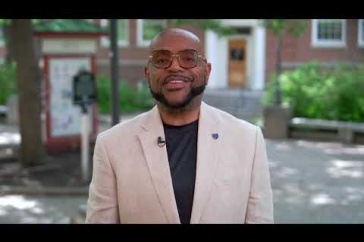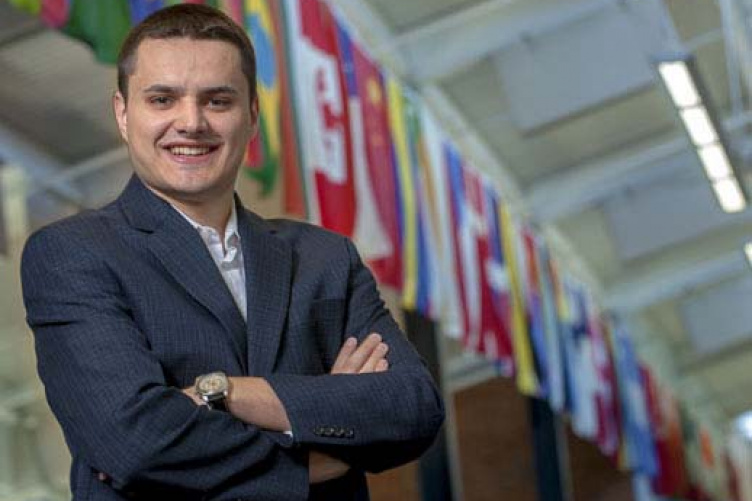
Jasmin Cesko’s earliest memories are of huddling in Bosnian bomb shelters in his mother’s arms while his father fought on the frontlines.
Cesko, a Muslim, was born in 1991. When the war in Bosnia began in 1992, his family was soon on the run from the “Serbian war machine.” For the next five years, they moved from town to town. As Cesko noted in a recent academic paper, according to the UN, approximately 100,000 people were killed during the war and more than two million were displaced.
“My family returned to Sarajevo in 1996 after we were reunited following my father’s release from a Serbian concentration camp where he was held for nearly a year,” writes Cesko. In 2001, when Cesko was 10, the family immigrated to Manchester, New Hampshire.
Cesko recounts some of this journey in a strong eloquent essay about his return to Sarajevo in the spring of 2013 on a David L. Boren Critical Language Scholarship. His goal was to learn to write in the Bosnian language and, importantly, to reacquaint himself with his former home. After reading his essay, it’s hard to envision Cesko as a shy elementary school student who had just come to America.
“It has always stuck with me,” recalls Cesko about those first days in an American school, “how I had been plucked away from everything I had known—overnight, a whole different world.”
Even without English, he was able to excel in math and art. But the next year, he spent fourth grade in an English as a Second Language (ESL) classroom with two teachers and other students who, like him, were learning English. “That was fun,” says Cesko. “I really enjoyed school that year.”
Cesko’s language skills were critical for his family, and he often helped his parents navigate the English-speaking world. Additionally, his skills paved the way for his two younger siblings.
“There is a significant Bosnian population in Manchester,” notes Cesko. “We have a community center and that has made the adjustment easier for us. It’s a place for our Islamic religion, Bosnian language, culture, folklore, sports, and other youth activities.”
Manchester itself has been a welcoming city. Cesko graduated from Central High School, which has about 2,000 students who hail from around the world. Sixty different languages can be heard in its hallways. Many students have come from war-ravaged countries.
“This is the beauty of America,” says Cesko. “We are living the American dream. So many of us have lost family members and have had to leave homelands. But here, we have been able to make decent lives. The opportunities are unmatched.”
Cesko chose UNH because of its proximity to his family, and, of course, he has paid his own way.
Still, like any other first-year student the question of a major loomed for Cesko. “But when I heard that term ‘political science,’” says Cesko, “I knew it was for me.”
|
Jasmin Cesko in Mostar, capital of Herzegovina, with the Stari Most (Old Bridge) in the background. The bridge is a 2004 reconstruction of a 16th-century Ottoman bridge, which stood for more than 400 years until it was destroyed during the war in 1993. VIEW SLIDESHOW >> |
Cesko declared that major along with international affairs and a minor in business administration. Soon, he found a roster of great professors, each of whom helped to develop his academic abilities and guided him toward opportunities. His papers analyze a range of international topics: from the military and strategic realities that affect governance in the newly accessible Arctic Sea, to the French governmental concept of “universalism” that doesn’t recognize “multiculturalism,” with unfortunate consequences.
Of course, the politics of his homeland, Bosnia and Herzegovina, are a major interest of his. At this year’s Undergraduate Research Conference, Cesko’s presentation, “It’s Time to Move Beyond Dayton: Changing the Constitutional Framework in Bosnia,” discusses the growing limitations of the agreement that led to peace, but also, in Cesko’s analysis, has deepened ethnic divisions.
Even with all of his studies and various jobs, Cesko has been committed to civic engagement. He has been active in the UNH Model UN, Student Senate, Muslim Student Association, and the Peace and Justice League.
All well and good, but when his adviser, Professor Chris Reardon, suggested and supported his application for the Boren scholarship, it enabled Cesko’s return to Sarajevo for that semester, and his spirit came full circle. Not only was he able to reconnect with family in Sarajevo, but he also made it his mission to visit all of the city’s historically and culturally significant landmarks—to learn and remember.
Toward the end of his Sarajevo visit, while drinking a coffee, Cesko heard the call to prayer from a nearby mosque, followed by the sound of church bells across the street. He writes: “At that moment it hit me, this is truly where East and West meet.”
It is this key understanding and interest that will inform Cesko’s future career path. For the past two summers, he has taught English in Turkey and interned at the Turkish Ministry of Foreign Affairs, developing a deep appreciation for the Turkish people and their culture. He plans to study the Turkish language and to further explore Istanbul, the world’s East-West capital city. Next fall, he will pursue his master’s degree in international studies at Johns Hopkins University School of Advanced International Studies, spending his first year at their campus in Bologna, Italy, returning to DC for his second year.
This spring, Cesko was honored with one of the University’s most prestigious awards, the Hood Achievement Prize, which recognizes "the senior man who shows the greatest promise through character, scholarship, leadership, and usefulness to humanity."
Originally published by:
-
Written By:
Staff writer | Communications and Public Affairs














































